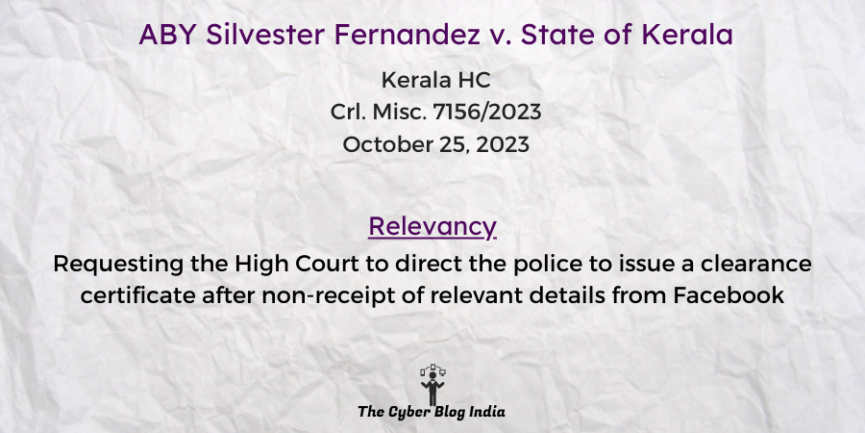ABY Silvester Fernandez v. State of Kerala

ABY Silvester Fernandez v. State of Kerala
In the High Court of Kerala
Crl. Misc. 7156/2023
Before Justice PV Kunhikrishnan
Decided on October 25, 2023
Relevancy of the case: Requesting the High Court to direct the police to issue a clearance certificate after non-receipt of relevant details from Facebook
Statutes and Provisions Involved
- The Information Technology Act, 2000 (Section 66E)
- The Indian Penal Code, 1860 (Sections 34, 506, 294)
- The Kerala Police Act, 2011 (Section 120(o))
- The Code of Criminal Procedure, 1973 (Sections 173, 482)
Relevant Facts of the Case
- The complainant lodged an FIR against the petitioner and several others.
- During the investigation, the police asked the Facebook law enforcement team to disclose the details of the Facebook IDs to ascertain the accused persons’ role. However, the police did not receive the relevant details from Facebook. They submitted the final report and recorded the complaint as “undetected” due to insufficient evidence.
Prominent Arguments by the Advocates
- The petitioner’s counsel submitted that the proceedings restricted the petitioner’s movement. He could not obtain a police clearance certificate as the police held the allegations undetected in the final investigation report. They also argued that the investigation had come to a temporary cessation with the report. Additionally, the police could reopen the case if they received relevant details from Facebook suggesting the petitioner’s role.
Opinion of the Bench
- The court opined that the police report had already closed the case as undetected.
Final Decision
- The court closed the case and directed the authority to furnish a police clearance certificate of non-involvement, affirming that the petitioner was not involved in the criminal case.
Jyotsna Sood, an undergraduate student at the National Law Institute University, Bhopal, prepared this case summary during her internship with The Cyber Blog India in May/June 2024.
